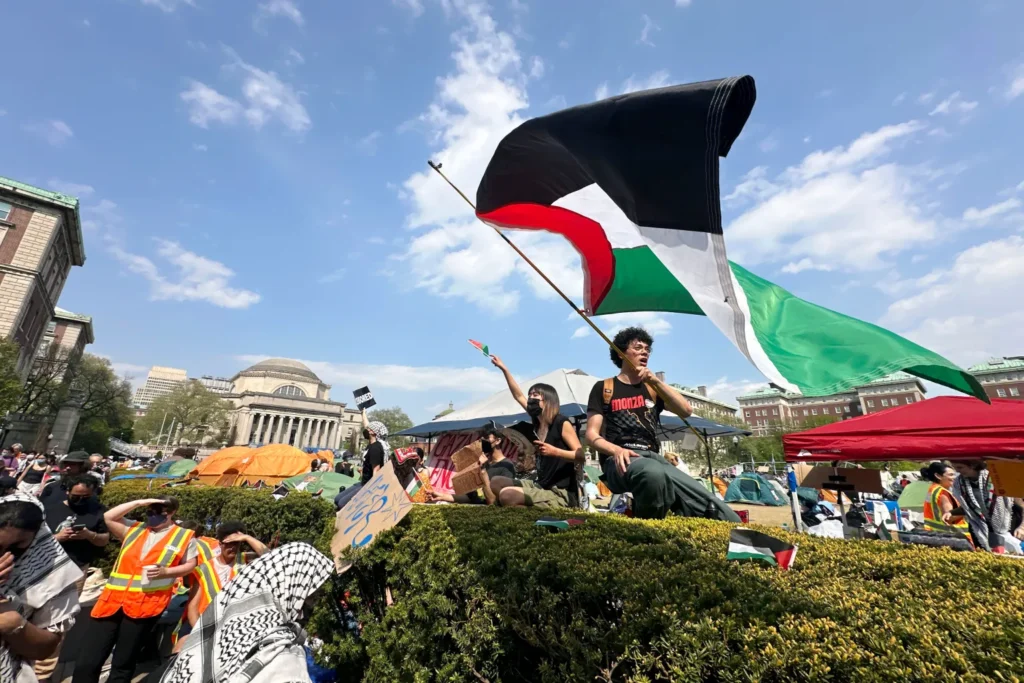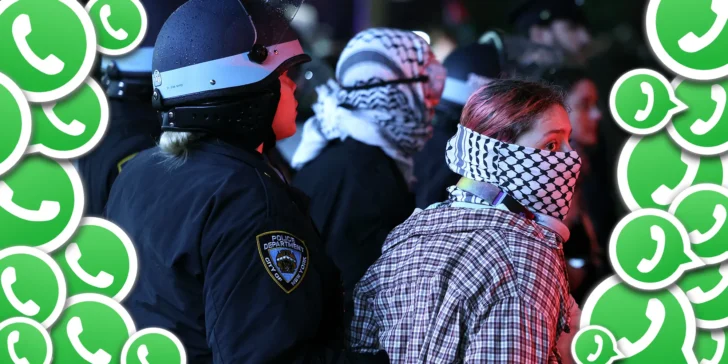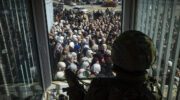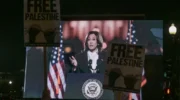For some members of the WhatsApp group, speaking out for Palestine and criticizing Israel are tantamount to supporting Hamas.
by Natasha Lennard, Akela Lacy, reposted from The Intercept, February 15 2025
EDITOR’S NOTE: Pro-Israel organizations consistently work to silence Palestine advocacy on campus – a free speech violation. One strategy they use, as described here, is to accuse Palestine allies of “supporting terror” or “defending Hamas.” Another is to accuse them of “antisemitism.”
As part of this strategy, Israel supporters often pressure universities to officially adopt the IHRA “definition” of antisemitism, which defines legitimate criticism of Israel as antisemitic. Other strategies include blocking prestigious appointments of and events with supporters of Palestinian rights, threatening to withhold major donations, and more. But supporters of Palestine on campus are fighting back.
It is also notable that pro-Israel orgs regularly sponsor trips to Israel for influencers and the influence-able – trips that invariably provide a whitewashed view of Israel and no exposure to the Palestinian narrative, and by withholding the truth, “buy” new Israel partisans.
When President Donald Trump issued an executive order threatening to deport international students involved in pro-Palestine protests, advocates expressed immediate concern that the move would target demonstrators — particularly Muslim and Arab students — for engaging in activity protected by the First Amendment.
Some members of the Columbia University community, however, leapt at the chance to get young people they claim are “supporters of Hamas” detained and deported. Several people on a large WhatsApp group, Columbia Alumni for Israel — which counts over 1,000 members, including parents, at least one current student, and Columbia professors — welcomed Trump’s plan.
Deporting Gaza protesters was already a topic of conversation in the Columbia Alumni for Israel group before Trump’s order came down. On the president’s first day in office, group members shared flyers advertising a pro-Palestine January 21 walkout to push the school to drop disciplinary actions against anti-war protesters.
“Identifying the Columbia student-Hamas-sympathizers who show up is key to deporting those with student visas,” former Columbia’s Teachers College assistant professor Lynne Bursky-Tammam said in the chat, according to screenshots from the WhatsApp group obtained by The Intercept.
Victor Muslin, another alumnus and pro-Israel activist, responded: “If there are photos of someone who needs to be identified (even with a partially obscured face) I have access to tech that may be able to help. DM me.”
Within a few days another member posted a link to the U.S. Immigration and Customs Enforcement tip line and wrote, “Let’s get to work.”
In late January, a group member shared an article about students who spray-painted a building and put cement in a sewage line to protest the anniversary of Israel’s killing of 6-year-old Hind Rajab. Bursky-Tammam responded to the article and questioned who was funding the protesters, adding, “Arresting them for hate crimes is not enough. We have to get rid of them.” (Bursky-Tammam declined to comment.)
The activities of the chat group, which formed in the wake of Hamas’s October 7 attack, come amid a wider campaign to crack down on dissent over Israel’s war on Gaza. Columbia has disciplined and suspended protesters — helping to create an environment that has fomented attacks using the courts, among other tactics. Members of the pro-Israel WhatsApp group, whose identities were confirmed by The Intercept using their phone numbers, were of a piece with these efforts, discussing how to report people to law enforcement, including the FBI.
With Trump taking the Oval Office, right-wing pro-Israel activists have focused their energy on using his draconian immigration policies to deal with Israel’s critics, including efforts to paint international student protesters as terrorists to have their visas revoked.
“It’s very disturbing that the alumni and parents are doing this,” said Abed Ayoub, executive director of the civil rights group the American-Arab Anti-Discrimination Committee. “Really, it’s an across-the-board attempt to silence and take away the First Amendment right of people simply because they don’t agree with them. It’s a very dangerous precedent.”
Critics of the school’s policies toward protesters say Columbia administrators have done little to intervene with attacks on students and faculty. On Thursday, two Columbia professors wrote an op-ed demanding that the school to condemn calls to deport its students.
“The Palestine exception to the First Amendment, to our right to free speech, has been something that’s been ongoing for so many years,” said Sabiya Ahamed, a staff attorney at the civil liberties group Palestine Legal, which filed a complaint about anti-Palestinian discrimination at Columbia that led to a federal investigation.
The success of offensives against pro-Palestine students and faculty on campuses across the country today stands as a testament to how far administrators have let pro-Israel advocates take their attacks, Ayoub said. And those efforts started before Trump took office.
“These universities have been laying the groundwork for whatever Trump wants to do. This targeting of the students did not begin once Trump was inaugurated. This began last year,” he said. “It began when they started targeting the students, putting them in disciplinary process, disciplinary proceedings, calling law enforcement and police to college campuses and putting the students in harm’s way.”
“We Have a List”
As campus protests grew in response to Israel’s assault on Gaza, the “Columbia Alumni for Israel” WhatsApp group kicked into overdrive. It soon became a hub for efforts to identify student and faculty protesters, claim they have links to Hamas, and discuss reporting them to the school or law enforcement agencies for alleged antisemitic activity — which, for the pro-Israel activists, includes anti-Zionist speech.
Screenshots from the group show its members frequently singling out Palestinian, Arab, and Muslim student activists, including some who have already faced disciplinary action. Faculty and other students, including Jewish student leaders, also land in the group’s crosshairs. Several messages show chat members discussing how to make reports to law enforcement, including contacting New York police and the FBI.
Several of the students named in the WhatsApp group have also been targeted by name by groups like Canary Mission, which publishes profiles of students involved in anti-Zionist activism, or in social media posts by the group “Documenting Jew Hatred on Campus at Columbia U,” which at least one chat member is involved in. One student mentioned in the chat was also named in a Twitter post from the Zionist group Betar, which last month sent a list of students it wants deported to the White House and federal agencies including ICE. (Students and faculty targeted in the screenshots from the chat declined to comment. The Intercept is withholding their names to protect them from any possible harassment.)
How Columbia has responded to the group’s activities, if at all, is unclear. Several group members have referenced meetings or correspondence with school administrators, including Columbia’s interim president, trustees, donors, and executive vice presidents.
“There are reasons why some of these efforts are not public,” wrote Heather Krasna, an associate dean of career services at Columbia, referencing meetings with top Columbia administrators. “For example, if certain efforts were publicized, specific individuals would possible [sic] be fired.” Krasna, whose handle on the WhatsApp group was simply the letter “H,” raised the possibility that their “efforts would backfire by giving pro-Hamas faculty political weapons by claiming external forces are trying to influence the university or squash free speech; a lot is happening that is confidential for these and other reasons.” (Krasna declined to respond to questions.)
Beyond pushing the school to target individual students and faculty — including calls to remove two deans — members of the WhatsApp group have also strategized how to best build cases to paint student protesters as “supporters of Hamas.”
Trump vowed to “quickly cancel the student visas of all Hamas sympathizers on college campuses” in a January 30 White House fact sheet published alongside his executive order. Like Trump, the WhatsApp group members regularly refer to opposition to the war on Gaza as sympathy or support for Hamas.
At one point, a group member pointed to an issue with only targeting foreign students: “And then there’s the problem that most of the students protesting are US citizens and cannot be deported.”
Bursky-Tammam, the former Columbia professor, also addressed how pro-Palestine U.S. citizens could be targeted. “If anyone can trace any of their funding to terror organizations, not a simple task, they can be arrested on grounds of providing ‘material support’ for terror organizations,” she wrote, referring to the Hind Rajab protest. “That is the key to getting these U.S. citizen supporters of Hamas, etc. arrested.”
Even before Trump’s executive order, Muslin, the Columbia alumnus, sent a message asking how to identify whether foreign students were on visas, and therefore eligible for removal.
“How does anyone know whether any given troublemaker is in fact a foreigner or on a visa (or not on a visa, given that Biden opened the border)?” Muslin also wrote, echoing a false right-wing claim about former President Joe Biden’s immigration policy.

Muslin, a technology executive, has been vocal in pushing colleges to treat criticism of Israel’s actions as examples of antisemitism. He founded CU-Monitor, an online platform that tracks anti-Zionism on campus. He also helps maintain the digital archive for the group Documenting Jew Hatred on Campus at Columbia U, which gathers reports of alleged antisemitic incidents. When one chat participant asked whether any members had connections to Canary Misson, another user replied, “Victor is an honorary bird.” (Muslin did not respond to multiple requests for comment.)
Last October, WhatsApp group administrator and Aliya Capital CEO Ari Shrage asked the group for help to “identify students who were protesting” and leaders of groups affiliated with the coalition Columbia University Apartheid Divest. Shrage, who co-founded the Columbia Jewish Alumni Association, wrote, “We have a list and need people to do some research.” Last month, he praised Trump’s executive order targeting campus protesters.
Among Jewish students targeted by the pro-Israel activists, particular ire was reserved for Jewish Voice for Peace, an anti-Zionist group whose Columbia chapter was already banned from campus. In one screenshot, a group member referred to members of JVP as “kapos,” a slur referencing Jewish prisoners forced to work as guards in Nazi concentration camps. At one point, following an opinion piece in the school paper by JVP members, Muslin asked for information about students involved in the group.
“Does anyone have a list of JVP members, especially group leaders or a way to get it,” Muslin wrote.
Another member responded: “My daughter will send me a list shortly,”
After the names were sent, Muslin was unsatisfied.
“Thank you. But we need more than theee [sic] random names of potentially low ranked members,” he wrote. “We need to hold leaders responsible for this antisemitic op-ed in the Spec. And we need to hold all members accountable for their membership in this despicable organization. Are club membership lists secret? How does one obtain a list of members in the official Columbia student club?”
Friends in High Places
Discussions in the group, which includes several people with teaching positions at Columbia, have also focused on efforts to communicate with school administrators and donors about the Columbia’s handling of campus speech.
In a discussion in late 2023 about how to get donors like the billionaire football team owner Robert Kraft to influence the school’s actions, Shrage wrote: “Robert is well aware of the situation.” Kraft announced last April that he would withdraw financial support from Columbia over its handling of the protests. Another group member shared a screenshot of Kraft’s contact card and said his friend knew Kraft personally and that he would reach out and report back with any information.
Gil Zussman, the chair of Columbia’s department of electrical engineering, along with Columbia Business School professors Ran Kivetz and Shai Davidai, are members of the WhatsApp group. Davidai became famous for his tirades against Gaza protests and has been accused by numerous students of online harassment. At one point, Kivetz shared a petition urging the removal of a dean over public comments at the school’s convocation last year. (Davidai, who was suspended from the Columbia campus after he posted videos of his confrontations with university staff online, declined to be interviewed without a video call. Kivetz did not respond to The Intercept’s request for comment.)
Zussman is a member of the school’s antisemitism task force, which was formed in November 2023 amid the protests. The task force, stacked with vocal supporters of Israel, has pushed the university to include expressions of anti-Zionism under its definition of antisemitism. Zussman regularly participates in the WhatsApp group by posting news stories, sharing his social media posts, and asking people to save protest material for an archive at the school. (Zussman did not respond to a request for comment.)
In July, Columbia alumnus Ilya Koffman told the group he had scheduled a meeting the following week with the university’s endowment arm on behalf of his private equity firm. “My initial instinct was to politely tell them we don’t want their money and explain why,” Koffman wrote, but he realized “it may be more effective to take the meeting and challenge them on what’s going on at Columbia and what, if anything, the investment arm of the endowment can and should do about it.” Koffman asked the group for any suggested questions or points. (Koffman declined to comment.)
Last April, more than 1,600 people including high-profile Columbia alumni and donors signed an open letter calling on President Minouche Shafik to clear encampments and discipline student protesters. Shafik stepped down last August amid pressure over her handling of the protests. Shrage, one of the WhatsApp group admins, wrote to the group on May 1 that he had co-authored the letter with Lisa Carnoy, a Columbia trustee emerita and current member of one of the board of visitors of the school’s Center for American Studies. (Carnoy did not respond to a request for comment.)
The alumni and donors wrote the letter “to keep pressure on the university,” Shrage said in the WhatsApp group. “Lisa hired Minouche and was former co- chair of the board,” he added, referring to Carnoy and Shafik. In another message to the group in November, Shrage wrote that Columbia alumnus David Friedman, a Trump adviser and former ambassador to Israel, was one of the first 22 people to sign the letter.
When the group member wrote in February about efforts to influence Columbia’s handling of campus speech “that are not public information” including “meetings with the Interim President,” Shrage replied and added that some of those efforts would not go public.
“A lot has already been done,” he wrote. “Multiple lawsuit, [sic] congressional hearings, meetings with influential (now former) donors, meetings and calls with people in DC, dozens and dozens of newspaper articles, an entire database of information that has been used by Congress and lawyers.”
Shrage added, “much much more that is not public information that likely will never become public info. We are all frustrated but much has been done and working together makes us all stronger.” Shrage declined to speak to The Intercept on the record.
Normalizing the Crackdown
In the past, Columbia opposed moves by the federal government that impacted foreign students. The school took part in litigation against ICE restrictions affecting international students in 2020 and issued a statement denouncing Trump’s order barring immigrants from several Muslim countries in 2017.
Lee Bollinger, the president of the university at the time, wrote that while it was important for the school to avoid political or ideological stances, it had a responsibility to step forward “when policies and state action conflict with its fundamental values, and especially when they bespeak purposes and a mentality that are at odds with our basic mission.”
For the WhatsApp group members who seek deportations and terrorism charges, the school’s actions against pro-Palestine students are regularly described as grossly insufficient. Palestine Legal’s Ahamed said, however, that the actions of groups like Columbia Alumni for Israel are aided by the school’s own crackdown on pro-Palestine protests.
“All of these things that the university has been doing has been normalizing the fact that it is wrong to say something about Palestine, it is against our policies to protest for Palestine,” she said. “That is the kind of message that the university has been sending. So it’s not that surprising then that you see these sorts of WhatsApp groups. And people feel comfortable being a part of a group like that.”
Natasha Lennard is a columnist for The Intercept. Her work has appeared in The Nation, Bookforum, and the New York Times, among others. She is the associate director of the Creative Publishing & Critical Journalism graduate program at the New School for Social Research in New York. She is the author of “Being Numerous: Essays on Non-Fascist Life.”
Akela Lacy is a Senior Politics Reporter at The Intercept. She was previously The Intercept’s inaugural Ady Barkan Reporting Fellow; prior to that, she was a Politics Fellow in the D.C. Bureau.
RELATED ARTICLES:
- Los Angeles Jewish Community Foundation funded shadowy group that targets students
- A well-connected NYU parent is trying to get students deported
- Unmasking counterprotesters who attacked UCLA’s pro-Palestine encampment
- US Senator Incites Violence Against Gaza Protesters
- Is Biden taking US to war with Iran? Pelosi: Pro-Palestinian protesters Russian/Chinese agents
- Giraldi: Students Are Taking the Lead in Denouncing Gaza Atrocities
- Pro-Israel students pressure Butler U to cancel an event featuring Angela Davis
- Flashback: U.S. agencies investigate Israeli “art students”





